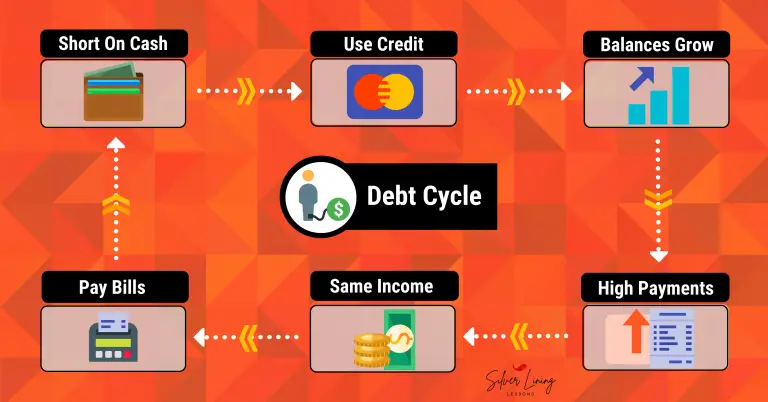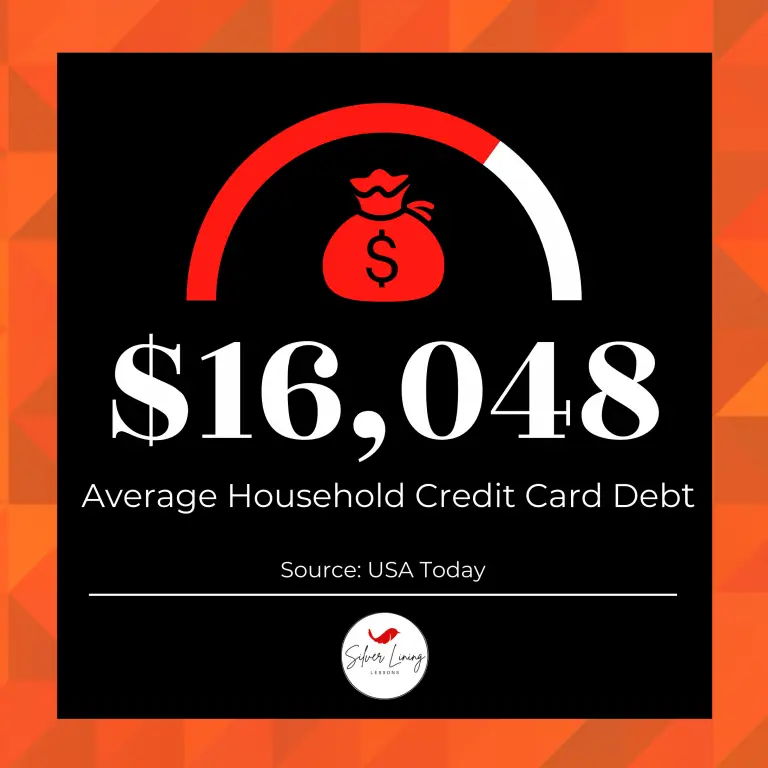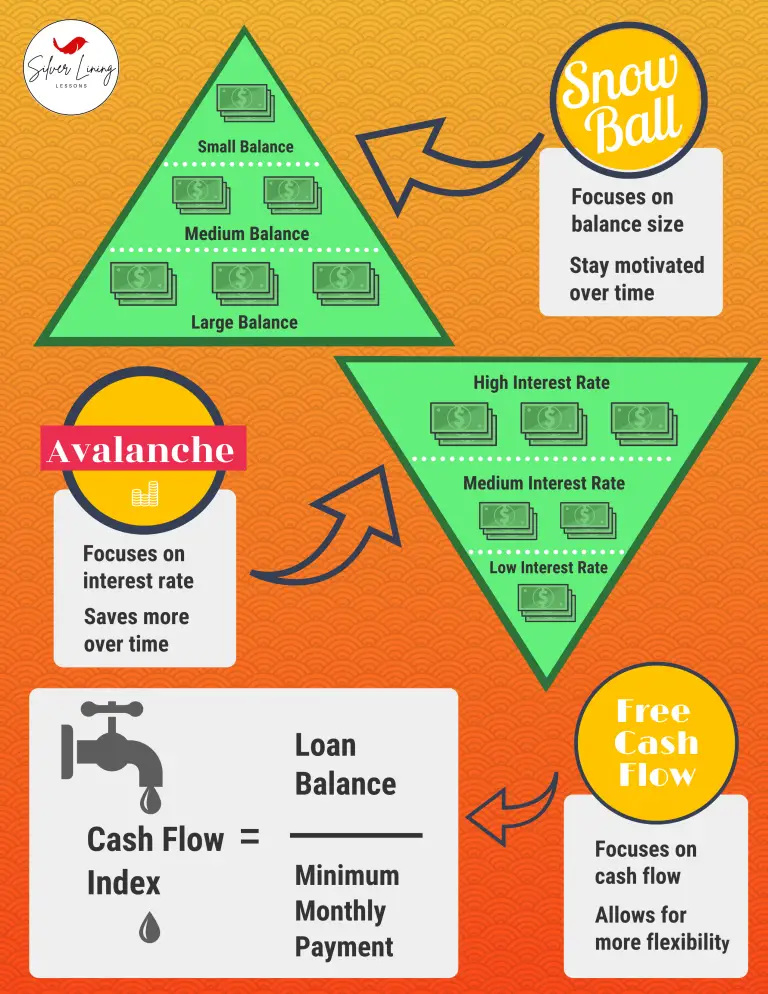Once you enter the debt cycle, it becomes almost impossible to break away and get back on your feet. So, how do you know if you're stuck in the debt cycle?
I had always believed that debt was just a part of life. Like me, most people were taught from an early age that it’s perfectly acceptable to carry debt throughout our adulthood. I was told mortgages and students loans are the “good” kind, because it’s an investment in your future. These offer us a chance at the “American Dream” at a cost we think we can afford. Today’s financial culture has us confused as to what we can and cannot afford. We’re sold on the idea of debt and that we can afford it as long as we are able to make those easy “minimum payments.”

What is the debt cycle?
The debt cycle is the process of continually borrowing more money, which leads to increased debt, increased costs, and eventual default. Part of this problematic cycle is that new debt crops up before you are done paying off the old. It can feel much like a never-ending tunnel once you’re smack dab in the middle.
How does the debt cycle work?
When you spend more than you bring in, you go into debt. At some point, the interest becomes a major monthly expense, and your debt increases even faster. Before you know it, you find yourself unable to even keep up with the required minimum payments. Trust me, I’ve been there! It’s such an overwhelming feeling, and all I wanted to do was get out but didn’t know how.
Unfortunately, like many others, I had trapped myself in this cycle and didn’t realize it until it was too late. It can be from outspending your income, borrowing to maintain a lifestyle, or paying off one debt and accruing another. For me, it was getting credit cards at a high interest rate, maxing them out, and barely making the minimum payments that got me caught in the debt trap.
Okay, so why can't I seem to break the debt cycle?
Being stuck in the debt cycle can feel like swimming against the current and never making it any closer to shore. Each payment is a struggle to keep your head above water. At some point, you have to stop the cycle to start paying off debt. These are just a few things that may be keeping you stuck.

No Emergency Fund
An emergency fund provides a cushion to help you in inevitable emergencies, like a car repair, sick child, or unexpected dental bill. This financial buffer allows you get through a tough time without having to take on more debt. With no buffer, you’ll definitely incur more debt when surprises pop up. If you’ve followed along with my payoff journey so far, you’ve seen that I have experienced many of these mini-disasters already.
Part of finding yourself stuck is lack of planning. If you prepare for these unforeseen events with an emergency fund, you won’t have to panic or stress nearly as much as being caught flatfooted. Once you’ve dipped into your emergency fund, simply stop any further debt payoff until the fund is replenished. To read more about emergency funds, check out The Baby Emergency Fund.
Your habits dont change
The debt cycle will only change if you change. Sacrifices have to be made. Clearing debt is about paying off past purchases while simultaneously paying off new purchases. The more you can limit new purchases, the easier it becomes to break the cycle. A lot of people in debt love material things and even just the process of buying. Changing habits means rethinking and evaluating your purchases before closing out your cart. Every time you want to click “Add to cart,” ask yourself if it’s worth adding on to your growing balance. Do you really want to spend the next six months paying off a pair of shoes?

No Budget
It may sound like a very simple concept, but honestly most debt happens when you spend more than you earn. Knowledge is power when it comes to your finances. If you are aware of your budget, you can be more mindful of your spending, which helps you attack the debt. To stop the cycle, you have to pay down the outstanding balances. The best way to do this is by working the payments into your monthly budget, but you can’t do this without accurate numbers. It’s key to track every dollar you spend in order to develop an accurate plan, and then you can apply every available dollar to your debt. Think of getting your budget in line as throwing a wrench into the debt cycle. Head over to Why The Dollar Tracker Makes More Cents for more on this.
The delay game
Some people stay in debt because they’re too afraid to make any moves. Others delay payoff thinking it’ll be easier when they start earning more money. Being in debt feels comfortable for most of us. You’re sending in the minimum payments, you’ve always used credit cards, you’ve always had a car note, and it can be hard to commit to financial changes. Playing the delay game is just putting off the necessary reality that you have to make money moves to see a difference.
No plan
What are your debt goals?
We have to ask ourselves these questions to make sure we are on a path to our financial goal. While it seems like throwing money at various debt is good and you may eventually pay it all off, having a debt payoff plan will get you there much quicker. When you start thinking about saving for college, paying off credit cards, chipping away at a mortgage, saving for retirement, and budgeting, it can all be overwhelming.
Don’t spread yourself too thin by trying to tackle all of your financial goals at once.
Develop a plan and pick a strategy. Your emergency fund is the foundation which you build upon. Payoff strategies like the snowball, avalanche, and free cash flow method will set you on the path toward financial freedom. While paying off your highest interest rate first with the avalanche method will save you the most money overall, it may not be the most motivating.

No Endgame
How many times have you lost weight, just to gain it all back plus some? It’s the same with debt. Many people focus all of their energy and make it their primary goal to get out of debt, but they’re lost when they actually get out. While it’s definitely time to celebrate, it’s not time to quit working. A solid financial plan is just as important after payoff to maintain your newfound security, continue improving your financial future, and avoid falling back into the debt cycle.
Identifying your long term goals and understanding your reasons to achieve and maintain financial security are keys to your success. Once you’re out of debt, then what? Again, our reasons, our “why” if you will, and our goals will keep us focused and give us that fire to stay the path toward long term success.
Once you’re out of debt, you are in a position to do more of the things you enjoy the most. You worked hard to reach that finish line, but without an endgame, you’re likely to find yourself back where you started. You’ve worked way too hard for that!
No motivation
It’s easy to be excited and motivated when you finally decide to get out of debt. The beginning is new and fresh! Most of us start with the best of intentions, make a few payments, but quickly lose motivation. That initial enthusiasm wears off, and the long process is more work than fun, gradually forcing some back into old habits.
The idea of becoming debt free is exciting, but actually becoming debt free is hard work. As time creeps by, many easily lose sight and motivation. This is one of the most common reasons why people remain stuck in the debt cycle. Losing motivation will make or break you.
Keep going
If you’re feeling the burnout, you’re doing it right. Don’t give up when it gets tough and you get tired. Just keep going! Check out these posts to help:
- How I Paid Off Over $20k in 8 Months
- Financial Fitness in 2021
- 10 Highly Effective Habits of Rich People
- 6 Must Read Books to Prevent Debt Payoff Burnout
As soon as you stop using debt as a method of payment, you will be on track to breaking the debt cycle. Recognize and correct the things keeping you from making progress toward your financial goals.
No matter where you are on your financial journey, there are plenty of methods and strategies to help you get a handle on your debt. It doesn’t matter how much of it you have, there is hope by establishing smart habits and living within a strict budget. Debt can be a very normal part of life, but it doesn’t have to control your entire life.
What is the number one thing keeping you in the debt cycle?
Remember to SUBSCRIBE and FOLLOW US to stay up to date on all things Silver Lining Lessons!
**The links in this post are affiliate links. This means if you click on the link and purchase an item, I will receive an affiliate commission at no extra cost to you. All opinions remain my own.

